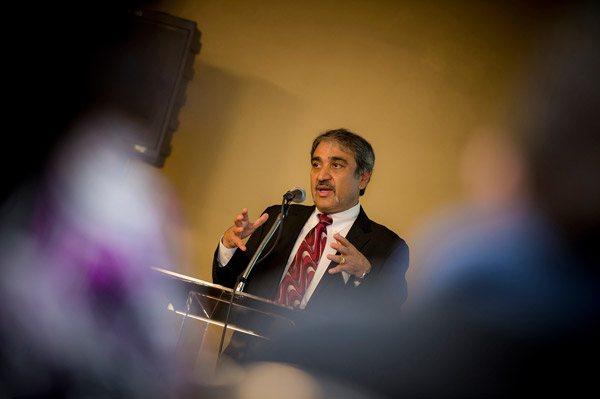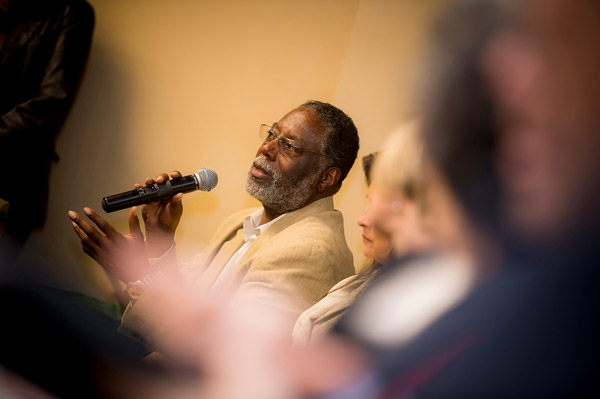Chancellor Takes Strategic Planning Initiative Out Into the Community

UC San Diego’s strategic planning process moved out into the community when Chancellor Pradeep Khosla held brainstorming sessions with leaders of diverse and underserved areas of San Diego County.
At back-to-back town hall forums – on Feb. 6 in East San Diego and Feb. 7 in National City – community representatives urged the Chancellor to bridge the demographic divides that can make the campus seem remote from stakeholder groups in its own region. Led by members of the Chancellor’s Community Advisory Board, the discussions focused on providing educational opportunity to local youngsters and applying university expertise to address local economic and policy challenges.
“We’ve been in this community for 52 years,” Chancellor Khosla told the gathering, “and it would be reasonable to say that the community is still wondering, ‘What does UC San Diego do for us?’” The strategic planning initiative “will help us redefine our relationship with the community,” he added.
Forum participants included educators, elected officials, business leaders, and community activists. Many related their experiences as UC San Diego alumni and parents of students or alumni. The group responded to three questions with an array of recommendations for aligning campus priorities more closely with community needs.
How can UC San Diego expand its physical presence and outreach programs in the community?
- A UC San Diego satellite presence in South County, which has sought its own 4-year university for many years, would be a hub for admissions outreach efforts, faculty research projects, student internships, and staff community service activities.
- Recruitment of East San Diego and South County schoolchildren by UC San Diego faculty, students, and staff should take place in their classrooms and neighborhoods, and these students should be invited to campus for special tours and activities. Such sustained “in-person” outreach could make the university seem more welcoming to qualified first-generation college-goers who cannot afford to matriculate outside the San Diego area.
- UC San Diego must strive to counteract the “north of Interstate 8” perception that it is more closely associated with residents in the North County campus vicinity than with underserved South County residents.

Do current UC San Diego degree programs meet the needs of today’s workforce and the community?
- There was a very strong consensus for a program that would provide greater opportunity for transfer student admissions to UC San Diego now that the Transfer Admissions Guarantee is being phased out. Participants expressed support for strengthening the UniversityLink program. The university must rebuild its alliances with community colleges and K-12 schools to help disadvantaged students find new pathways to a UC education.
- Businesses in East San Diego and South County are eager to form partnerships with the Rady School of Management that would nurture entrepreneurship and technology transfer in economically depressed areas.
- Given the rich diversity of its region, UC San Diego is positioned to be a national pioneer in developing cultural competence research and curricular programs.
How can UC San Diego better serve the San Diego and California community and economy?
- To bolster the regional economy, UC San Diego should make special efforts to fill job vacancies with local applicants and to award contracts to local businesses, and it should pay local contractors more promptly. The campus could raise its profile as an equal opportunity economic engine through collaborations with the San Diego Workforce Partnership and with Chambers of Commerce in South County.
- Campus leaders should seek grant funding to launch redevelopment projects that would revive blighted areas through urban agriculture and other sustainability ventures.
- As one example of using university expertise to solve local problems, UC San Diego mathematicians and social scientists could explore ways to reduce long wait times for northbound traffic at the U.S.-Mexico border.
Chancellor Khosla wrapped up the sessions with a request and a pledge. He asked participants to stay involved in the strategic planning initiative – “in this process,” he said, “the community has a responsibility, and we have a responsibility to the community” – and he promised to meet regularly by quoting the immortal last line from the movie “Casablanca”: “I think this is the beginning of a beautiful friendship.”
